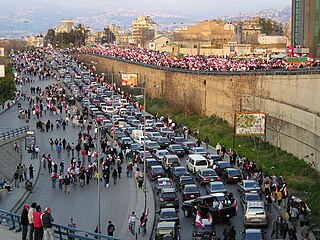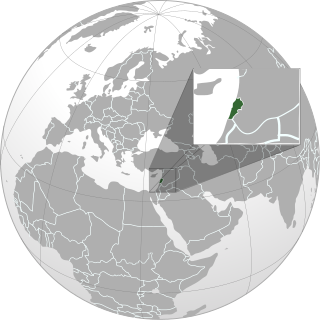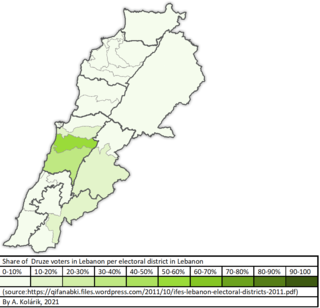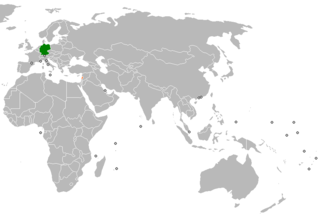
Lebanon, officially the Republic of Lebanon, is a country in the Levant region of West Asia. It is bordered by Syria to the north and east, by Israel to the south, and by the Mediterranean Sea to the west; Cyprus lies a short distance away from the country's coastline. Lebanon's location at the crossroads of the Mediterranean Basin and the Arabian hinterlands has contributed to the country's rich history and shaped a unique cultural identity shaped by religious diversity. Lebanon has a population of more than five million people and covers an area of 10,452 square kilometres (4,036 sq mi). Lebanon's capital and largest city is Beirut, followed by Tripoli and Jounieh. While Arabic is the official language, French is also recognized in a formal capacity; Lebanese Arabic is the country's vernacular, though French and English play a relatively significant role in everyday life, with Modern Standard Arabic being limited to news and government matters.

Patrick Jake O'Rourke was an American author, journalist, and political satirist who wrote twenty-two books on subjects as diverse as politics, cars, etiquette, and economics. Parliament of Whores and Give War a Chance both reached No. 1 on the The New York Times bestseller list.

The Kataeb Party, officially the Kataeb Party – Lebanese Social Democratic Party, also known as the Phalanges, is a right-wing Christian political party in Lebanon founded by Pierre Gemayel in 1936. The party and its paramilitary wings played a major role in the Lebanese Civil War (1975–1990), opposing Palestinian forces in the country as well as collaborating with Israel. Pierre's youngest son Bachir, the leader of the party's militia, was elected President in 1982, but was assassinated before he could take office. He was succeeded by his older brother Amine, who led the party through much of the war. In decline in the late 1980s and 1990s, the party slowly re-emerged in the early 2000s and is currently part of the Lebanese opposition. The party currently holds 4 out of the 128 seats in the Lebanese Parliament.
Sectarianism is a debated concept. Some scholars and journalists define it as pre-existing fixed communal categories in society, and use it to explain political, cultural, or religious conflicts between groups. Others conceive of sectarianism as a set of social practices where daily life is organised on the basis of communal norms and rules that individuals strategically use and transcend. This definition highlights the co-constitutive aspect of sectarianism and people’s agency, as opposed to understanding sectarianism as being fixed and incompatible communal boundaries.

The Alawites, also known as Nusayrites, are an Arab muslim sect that live primarily in the Levant and follow Alawism, a religious sect that splintered from early Shi'ism as a ghulat branch during the ninth century. Alawites venerate Ali ibn Abi Talib, revered as the first Imam in the Twelver school, as the physical manifestation of God. The group was founded by Ibn Nusayr during the 9th century. Ibn Nusayr was a disciple of the tenth Twelver Imam, Ali al-Hadi and of the eleventh Twelver Imam, Hasan al-Askari. For this reason, Alawites are also called Nusayris.

Walid Kamal Jumblatt is a Lebanese Druze politician and former militia commander who led the Progressive Socialist Party from 1977 until 2023. While leading the Lebanese National Resistance Front and allying with the Amal Movement during the Lebanese Civil War, he worked closely with Suleiman Frangieh to oppose Amine Gemayel's rule as president in 1983. After the civil war, he initially supported Syria but later led an anti-Assad stance during the start of the Syrian Civil War. He is still active in politics, most recently leading his party, the Progressive Socialist Party (PSP) in the 2022 Lebanese general election.

The Syrian occupation of Lebanon began in 1976, during the Syrian intervention in the Lebanese Civil War, and ended on April 30, 2005, after the Cedar Revolution and several demonstrations in which most of the Lebanese people participated. The withdrawal agreement was signed by President Bashar al-Assad and Saad Hariri, son of Rafic Hariri, whose assassination triggered the series of events leading to the withdrawal.

Salam Zgharta Football Club, known as Salam Zgharta or simply Salam, is a football club based in Zgharta, Lebanon, that competes in the Lebanese Second Division.

The history of the Jews in Lebanon encompasses the presence of Jews in present-day Lebanon stretching back to biblical times. While Jews have been present in Lebanon since ancient times, their numbers had dwindled during the Muslim era. Through the medieval ages, Jewish people often faced persecution, but retained their religious and cultural identity.
An amnesty law is any legislative, constitutional or executive arrangement that retroactively exempts a select group of people, usually military leaders and government leaders, from criminal liability for the crimes that they committed. More specifically, in the 'age of accountability', amnesty laws have come to be considered as granting impunity for the violation of human rights, including institutional measures that preclude the prosecution for such crimes and reprieve those crimes already convicted, avoiding any form of accountability.

Nabil Kanso was an American painter. Kanso began his career in 1968, New York during the start of the neo-expressionist movement. His works dealt with contemporary, historical and literary themes, and were marked by figurative imagery executed with spontaneous and vigorous handling of the paint and often done on large-scale formats. They reflected movement and tension embodying intense colors and symbolic forms addressing social, political, and war issues. The Vietnam War and the Lebanese Civil War profoundly affected the development and scope of his themes dealing with violence and war. His long-running Split of Life series encompassed an extensive range of enormous paintings depicting scenes of human brutality and suffering.

The Lebanese Druze are an ethnoreligious group constituting about 5.2 percent of the population of Lebanon. They follow the Druze faith, which is an esoteric Abrahamic religion originating from the Near East, and self identify as unitarians.
Sectarianism can be defined as a practice that is created over a period of time through consistent social, cultural and political habits leading to the formation of group solidarity that is dependent upon practices of inclusion and exclusion. Sectarian discrimination focuses on the exclusion aspect of sectarianism and can be defined as 'hatred arising from attaching importance to perceived differences between subdivisions within a group', for example the different denominations of a religion or the factions of a political belief.

Rima Maktabi is a Lebanese TV presenter and award-winning journalist who returned to al-Arabiya after hosting CNN's monthly program Inside the Middle East for two years and previously working at the Arab satellite channel since 2005. She was among several female Arab journalists who first became known through her reporting during the 2006 Lebanon War and who had successful careers afterward, including Maktabi and her former colleague at al-Arabiya Najwa Qassem.

The Battle of the Hotels was a subconflict within the 1975–77 phase of the Lebanese Civil War that occurred in the Minet-el-Hosn hotel district of downtown Beirut. This area was one of the first major battles of the war that began in April 1975. The battle was fought for the possession of a small hotel complex, the St. Charles City Center, adjacent to the gilded Corniche seafront area on the Mediterranean, in the north-western corner of the downtown district of Beirut, and it quickly spread to other areas of central Beirut. The often fierce battles that ensued were fought with heavy exchanges of rocket and artillery fire from the various hotel rooftops and rooms. Sniper fire was commonly utilized.

Holidays in Heck: A Former War Correspondent Experiences Frightening Vacation Fun is a 2011 book by P. J. O'Rourke about the author's travels to various venues.

Republican Party Reptile, subtitled The Confessions, Adventures, Essays and (Other) Outrages of P. J. O'Rourke is a 1987 collection of essays by American satirical writer P. J. O'Rourke. Some of the works were previously published in House & Garden and Harper's. O'Rourke planned to promote the book at the 1988 Republican National Convention. Though he described himself as a conservative Republican, this was not allowed, reportedly because the GOP did not appreciate O'Rourke's sense of humor. In the essay that gives its title to the collection O'Rourke describes a "Republican Party Reptile":
We are in favor of: guns, drugs, fast cars, free love, a sound dollar, and a strong military with spiffy uniforms. There are thousands of people in America who feel this way, especially after three or four drinks. If all of us would unite and work together, we could give this country.. . well, a real bad hangover."

In the narrow sense, Lebanese people in Germany include migrants from Lebanon living in Germany and their descendants, excluding Palestinians.

Hezbollah involvement in the Syrian Civil War has been substantial since the beginning of armed insurgency phase of the Syrian Civil War in 2011, and evolved into active support for Ba'athist government forces and troop deployment from 2012 onwards. By 2014, Hezbollah was deployed across Syria. Hezbollah has also been very active in preventing Al-Nusra Front and Islamic State penetration into Lebanon, being one of the most active forces in the Syrian Civil War spillover in Lebanon.

Germany–Lebanon relations are "traditionally friendly" and "very close", according to the German Foreign Office. For Lebanon, Germany is one of the most important donor countries for the care of the numerous refugees in the country. Among the Arabs in Germany, the Lebanese are among the largest groups with almost 160,000 members (2021).

















